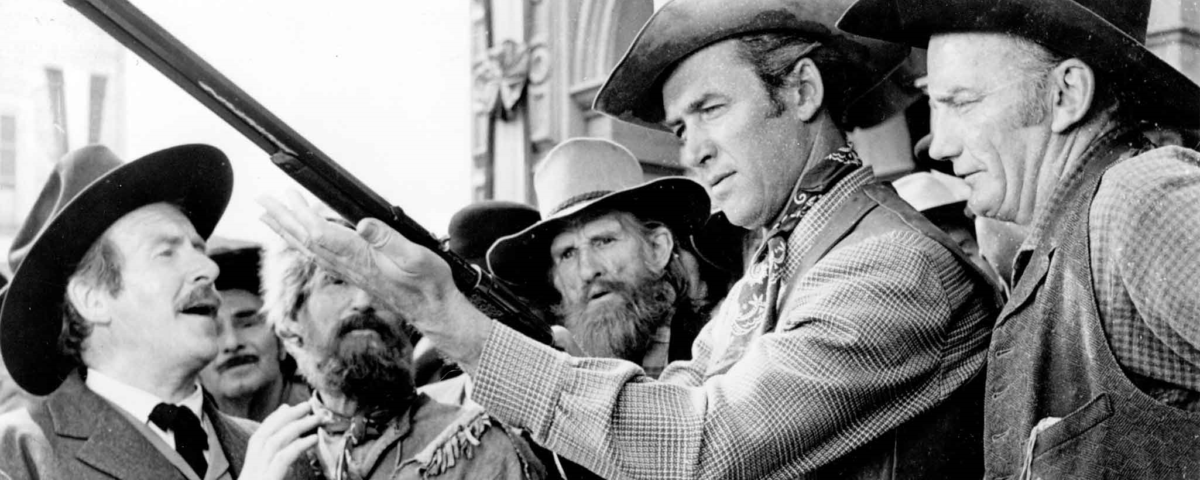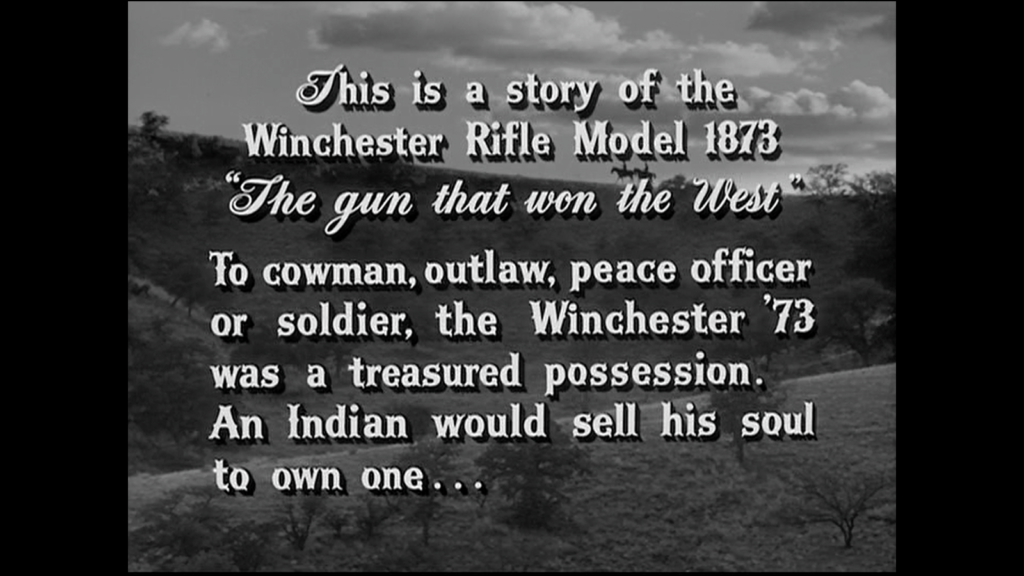Another Underrated List is yet another list of so called “underrated” films from yet another white guy who writes about films on the internet. This issue, I’m adding Winchester ’73, a noirish, little western from 1950 that showed signs of the darker direction in which the genre was headed, to this list.
Winchester ’73 is the story of a gun, the so called “Gun That Won the West.” It’s opening title card directly states this, before the camera locks onto a shop window housing the gun, with onlookers ogling it. Later on, we will be told by none other than Wyatt Earp, that this gun is one in a thousand, that when Winchester is manufacturing it, “every so often, maybe one gun out of every ten or twenty thousand, well, it comes out just perfect. Now naturally it ain’t for sale. I would give a year’s wages for that gun. But money won’t buy it. I wouldn’t be right to sell it. So, the Winchester people, they have given it a name. They call it one in a thousand. And that’s a good name.”
As you can imagine from this monologue, everyone present in Dodge City on July 4th, 1876 to hear Earp give it, is obsessed with the gun. From the little kids who eye it and debate what their fathers say are the best guns, to the men drawn from all over the U.S. to compete for it in a rifle shoot.
One of these competitors is Lin McAdams (James Stewart) a solemn faced stranger to Dodge City, who, as he rides into town, declares to his partner “High-Spade” Frankie Wilson (Millard Mitchell) that, “If he isn’t here already, that gun will bring him.”
This single line of dialogue can describe the entire film. The ninety minutes that follow it contain a single minded pursuit, from one town or hideout to the next, in which the gun serves only to add fuel to the fire of Lin’s desire for revenge against the aforementioned man.
That man is Dutch Henry Brown (Stephen McNally). As soon as he is introduced, it’s obvious that Dutch Henry Brown isn’t his birth name. But what isn’t obvious is the why Dutch Henry and Lin want to kill each other from the moment their eyes first lock on-screen. Thanks to Earp and Dodge City’s no gun rule however, they are prevented from doing so until after the rifle shoot is over. When it is over and Dutch loses the rifle shoot to Lin, only to assault him and steal the gun, the gun becomes a physical manifestation of the bad blood between the two men. It becomes yet another reason for each to try and kill the other.
I first came to Winchester ’73 after becoming enraptured with director Anthony Mann’s genre defining, film noirs. In T-Men, He Walked by Night, and Raw Deal, Mann, together with cinematographer John Alton, exquisitely used black and white lighting to present tortured and frantic worlds of crime. Characters merge in and out of the shadows, both in the literal and figurative since.
Mann, though without Alton this time around, brings this same sense of darkness and complex morality to his first outing, and subsequent ones, in the western genre. In a scene set around the campfire, Lin McAdam’s obsessive quest to kill Dutch Henry Brown is questioned by High-Spade, Lin’s long suffering but always faithful companion.
High-Spade tells Lin, “Hunting for food, that’s all right. Hunting a man to kill him? You’re beginning to like it.” Lin, like most, traditional protagonists, immediately denies this, but High-Spade doesn’t stop there asking, “What happens when the hunt is over? Then what?” Lin doesn’t know how to respond to this, giving only the half-baked notion that they’ll reform the old ranch, which we know will never happen, before declaring “I hadn’t given it much thought.”
While this is only one scene, and throughout most of the film Lin’s quest for revenge is depicted as just, it’s little moments like this one that show some of the traditional, western mythos starting to be chipped away at.
However, some of those mythos are still very much present in Winchester ’73 as it portrays the usual racism against Native Americans, featuring a young Rock Hudson in redface, and a complete absence of any other people of color that also would have lived and died in the west.(One in Four cowboys were African-American) In doing so, it still follows the same old manifest destiny myth, or “How the West Was Won”, that defines the traditional western formula. Native Americans and people of color don’t fit into this formula because they aren’t the people who won the west, but rather those who were supposed to lose it.
Though, Winchester ’73 ultimately isn’t that much of a departure from the westerns that came before it in this aspect and in many others, it shows glimpses of the darker, more introspective tendencies of the genre that would appear in later films such The Searchers and Unforgiven and even later Mann-Stewart Westerns like The Far Country. Above all, it questions, if only briefly, the morality of Lin’s quest for revenge, something that too few films do even to this day.
Winchester ’73 is currently streaming on Amazon and Starz. However, for $9.99 you can buy a wonderful, DVD 4-Pack containing not only Winchester ’73 but also the film adaption of Harvey, The Glenn Miller Story, which is another Mann-Stewart collaboration, and You Gotta Stay Happy.
Originally published in April of 2019


